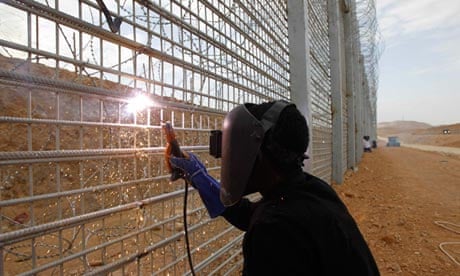The number of migrants crossing the border between Egypt and Israel dropped to zero last week for the first time since 2006, as construction of the last small sections of a 150-mile fence is due to be completed in the coming weeks.
A total of 36 migrants crossed into Israel from Egypt in December, all of whom were detained, compared with 2,295 in January. The numbers have steadily declined throughout 2012 as construction of the vast steel fence through the desert from Eilat to the border with Gaza has progressed.
"We have succeeded in blocking the phenomenon of illegal infiltrators," said the Israeli prime minister, Binyamin Netanyahu. "It has been several months now that no infiltrator has reached [the Israeli cities of] Eilat, Be'er Sheva, Tel Aviv or any Israeli community."
Israel was repatriating migrants to their countries of origin, he said.
"For several months now, hundreds of infiltrators have been leaving here … and thousands will soon do so every month until the tens of thousands of people who are here illegally return to their countries of origin."
More than 9,000 migrants were deported in 2012, including almost 4,000 from African countries. Critics of the deportation policy say many migrants face extreme danger in their home countries.
"There is no doubt the fence is working as a deterrent," said Sigal Rosen, of the Hotline for Migrant Workers. But, she added, Israel's policy of preventing refugees crossing the fence, which is constructed on Israeli territory, was illegal under international law. "If a person is asking for asylum, a country has a duty to check their request."
The fence along Israel's southern border is estimated to have cost about 1.4bn shekels (£240m). Israel now has physical barriers along all its land borders apart from one section abutting Jordan, from Eilat to the Dead Sea. Plans to erect a fence along that border are under discussion.
Israel accelerated construction of the southern border fence after an attack by militants in August 2011 in which eight Israelis were killed, with the aim of completing it by the end of 2012. The remaining gaps, which total eight miles, are on mountainous terrain near the Red Sea resort of Eilat.
The purpose of the fence is to deter illegal immigration, cross-border militant activity and the smuggling of drugs and weapons. More than 65,000 migrants‚ mainly from Eritrea and Sudan, have entered Israel illegally from Egypt since 2006, according to government figures.
A US state department report on human rights noted that Israel approved one out of 4,603 applications for asylum in 2011.
The latest immigration figures came as an Eritrean man appeared in court in Tel Aviv on Monday, accused of raping an 83-year-old woman on 21 December. The interior minister, Eli Yishai, said: "The shocking rape is a symptom of a loss of sense of security among Israeli citizens in areas where there are high concentrations of infiltrators."
Leaders of a far-right party called for a mass protest in Tel Aviv on Monday evening. Rosen said she was afraid it could turn into a pogrom. Anti-migrant sentiment was growing "because of incitement by politicians against Africans", she said.
Earlier this year, Yishai suggested migrants were committing rapes and were "Aids carriers". MP Miri Regev said Sudanese refugees were a "cancer in our body".
